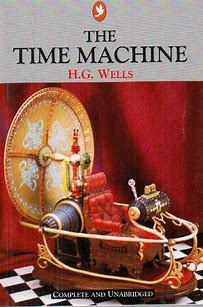When someone accelerates through space, his duration is stretched or dilated by contrast with that of anyone moving more slowly than he is. However, within his enclosed spaceship environment, he is not aware of any difference. There are still sixty minutes between 01:00 and 02:00 on a clock. He still experiences an hour as sixty times longer than a minute.
But each of us moves within his own particular relativistic frame of reference. Within his own frame of reference, someone can accelerate from sixty miles per hour to a hundred and twenty miles per hour but cannot accelerate from sixty minutes per hour to a hundred and twenty minutes per hour.
Extension is measured in units of length. Endurance is measured in units of time. Velocity is measured in units of length by units of time. Thus, endurance is like extension along a fourth dimension, not like motion along the fourth dimension. The Time Traveller confuses the issues horribly in his introductory exposition!

5 comments:
Kaor, Paul!
Wells was pioneering time traveling in THE TIME MACHINE, so I don't blame him too much for making a muddle of it in that story.
Ad astra! Sean
You can -slow down- your duration by physical acceleration. This is the inverse of increasing your physical velocity. (Which is why time travel is mathematically equivalent to FTL.)
I still don't get why FTL and time travel are mathematically equivalent but I am not a mathematician.
Paul: well, neither am I. If you were traveling -at- the speed of light, I'm told that your duration would more or less stop.
This is equivalent to time travel; if you get to 99.9%C, you can travel into the future the way Wells' time traveler did.
If you could -exceed- the speed of light, which you can't (not by direct acceleration, at least) you'd travel -backward- in time.
Kaor, Mr. Stirling!
I think I get that much, vaguely!
Of the two theoretical possibilities, FTL or time traveling, I prefer the former.
I've sometimes wondered if we should call FTL drives, both fictional and theoretically possible, Other Than Light drives, or "OTL." The ones that seems possible, fictional or not, don't seem to "work" by being faster than light.
Ad astra! Sean
Post a Comment